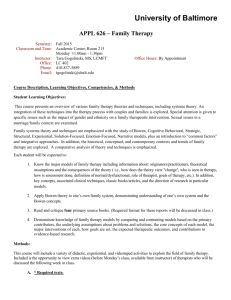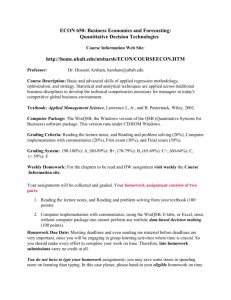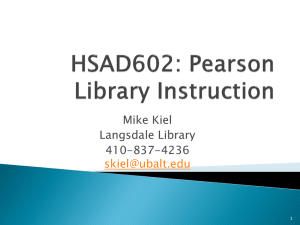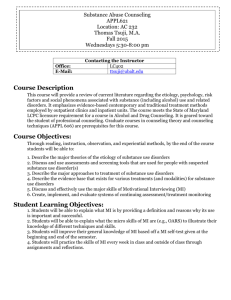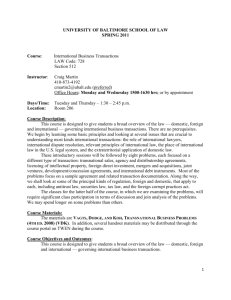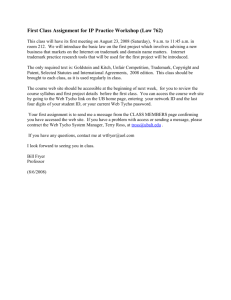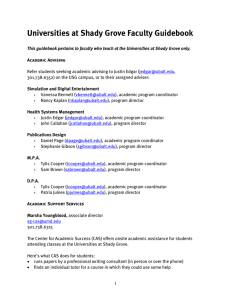AUGUST 17, 2015 - University of Baltimore
advertisement
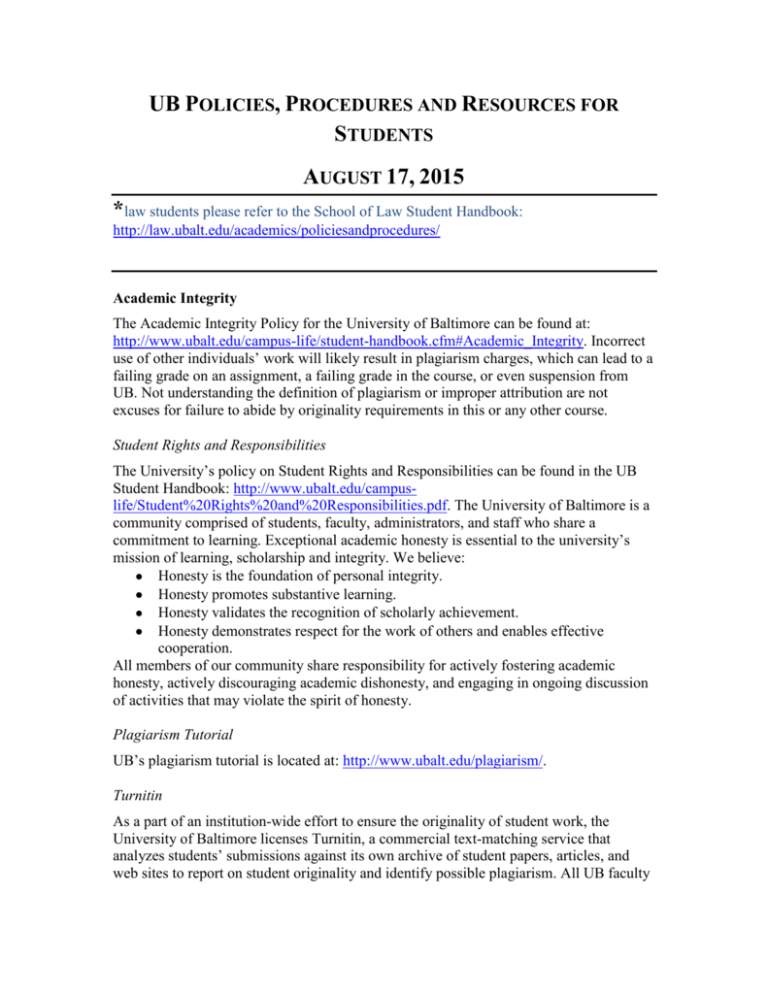
UB POLICIES, PROCEDURES AND RESOURCES FOR STUDENTS AUGUST 17, 2015 *law students please refer to the School of Law Student Handbook: http://law.ubalt.edu/academics/policiesandprocedures/ Academic Integrity The Academic Integrity Policy for the University of Baltimore can be found at: http://www.ubalt.edu/campus-life/student-handbook.cfm#Academic_Integrity. Incorrect use of other individuals’ work will likely result in plagiarism charges, which can lead to a failing grade on an assignment, a failing grade in the course, or even suspension from UB. Not understanding the definition of plagiarism or improper attribution are not excuses for failure to abide by originality requirements in this or any other course. Student Rights and Responsibilities The University’s policy on Student Rights and Responsibilities can be found in the UB Student Handbook: http://www.ubalt.edu/campuslife/Student%20Rights%20and%20Responsibilities.pdf. The University of Baltimore is a community comprised of students, faculty, administrators, and staff who share a commitment to learning. Exceptional academic honesty is essential to the university’s mission of learning, scholarship and integrity. We believe: Honesty is the foundation of personal integrity. Honesty promotes substantive learning. Honesty validates the recognition of scholarly achievement. Honesty demonstrates respect for the work of others and enables effective cooperation. All members of our community share responsibility for actively fostering academic honesty, actively discouraging academic dishonesty, and engaging in ongoing discussion of activities that may violate the spirit of honesty. Plagiarism Tutorial UB’s plagiarism tutorial is located at: http://www.ubalt.edu/plagiarism/. Turnitin As a part of an institution-wide effort to ensure the originality of student work, the University of Baltimore licenses Turnitin, a commercial text-matching service that analyzes students’ submissions against its own archive of student papers, articles, and web sites to report on student originality and identify possible plagiarism. All UB faculty members reserve the right to use this or other measures to evaluate your work for originality and proper attribution. Accommodations for Students with Special Needs Accommodations for students with special needs can be set up through the Center for Educational Access. For information see: www.ubalt.edu/cea Code of Conduct Students are expected to maintain a high standard of conduct. Since the university's role is to provide the best possible atmosphere for learning, individuals who violate its rules or regulations are subject to discipline. To the extent described in the Code of Conduct, the president of the university delegates authority over student discipline to the provost and the associate vice president for student affairs: http://www.ubalt.edu/policies/studentaffairs/code-of-conduct/code-of-conduct.cfm Grade Challenges Students have the right to a grade based on their actual course performance as compared to an articulated standard that is applied to all those taking a course. Each instructor must therefore be able to articulate a uniform, identifiable standard that is applied in calculating any part of a student's course grade. That standard must relate to the course syllabus, academic instruction, and the assignments and materials that were provided to the class. Policies and procedures related to grade challenges can be found at: http://www.ubalt.edu/campus-life/studenthandbook.cfm#Student_Grievances_and_Procedures (click on grading challenges) Incomplete Grades and Requests Incomplete (INC) grades will not be considered prior to the official WD deadline. After this date, and INC may be granted at the discretion of the instructor and the appropriate dean’s office based on tan anticipated extenuating circumstance. Incompletes are ordinarily issued to students whose circumstances meet all five of the following conditions: Your situation is emergent. By that we mean your situation was clearly unexpected, and there was simply no way you could have predicted it. Your situation is exceptional, which often coincides with the first condition. By that we mean your situation is unique and extraordinary. Your situation prevents you from completing your work. By that we mean your situation must seriously jeopardize your ability to complete work in the class. Prior to requesting the Incomplete, you must be passing the course and have completed the vast majority of your work. When your situation emerges, you must contact your professor about it as soon as possible. A timeline for grade completion is outlined in the catalog. For any of the above conditions, documentation may be required to officially issue the Incomplete. It is a good idea for students and faculty to have a formal written plan for completing coursework when an incomplete is issued. (Please see specific dates on the Academic Calendar for WD and refunds at http://ubalt.edu/about-ub/offices-andservices/records-andregistration/download/academic_calendars/Fall%202015%20Academic%20Calendar.pdf Mid-Semester Progress Reporting for Undergraduates Mid-Semester Progress Reports will be issued for all undergraduate students halfway through the semester. You will be issued an S/Satisfactory – which means you are passing the class with a C or better; an NS/Not Satisfactory – which means your grade is a C- or lower; or an FA/Failure due to absences. If you are in the NS or FA categories, you should contact your professor and advisor to discuss ways to improve your performance before it is too late. Title IX Sexual Harassment and Sexual Misconduct Policy The University of Baltimore’s Sexual Harassment and Sexual Misconduct policies are compliant with Federal laws prohibiting discrimination. Title IX requires that faculty, student employees and staff members report any known, learned or rumored incidents of sex discrimination, including sexual harassment, sexual misconduct, stalking on the basis of sex, dating/intimate partner violence or sexual exploitation and/or related experiences or incidents. Policies and procedures related to Title IX and UB’s nondiscrimination policies can be found at: http://www.ubalt.edu/titleix. UB RESOURCE CENTERS FOR STUDENTS Academic and counseling resources for students include but are not limited to: Achievement and Learning Center - http://www.ubalt.edu/alc Academic Center 113 alc@ubalt.edu 410.837.5383 The ALC is a free resource for all UB students and offers support in three ways: A tutor or study facilitator may be available for this course, either on-campus or online. Assistance in a variety of computer skills may also be available. Visit www.ubalt.edu/tutoring to learn more, or stop by AC113. Writing consultants can work with you one-on-one to improve your papers and provide suggestions for revisions. Writing consultants provide feedback on anything you're writing for UB courses at any point in the writing process, from getting started to final editing. You can also submit to the Online Writing Link through the MyUB portal to receive audio MP3 feedback; look for the OWL icon. To gain a competitive edge in the classroom or the workplace, make an appointment with the ALC Learning Consultant. Consultants work with students on goal-setting, time management, efficient learning strategies, working in teams, oral presentations, and exam taking. They can help you develop a personalized "master plan" for accomplishing your goals. To make an appointment, visit mywco.com/ubalt. Center for Educational Access - www.ubalt.edu/cea Academic Center 139 cea@ubalt.edu 410.837.4775 The University of Baltimore’s Center for Educational Access ensures that all UB students can achieve their academic potential unhindered by any disabilities. If you have a documented disability that requires accommodations, please contact the CEA. The center provides reasonable and appropriate accommodations for students with documented disabilities. Counseling Center - http://www.ubalt.edu/counseling Academic Center 111 counseling@ubalt.edu 410.837.5159 The Counseling Center delivers mental health services to UB students, promoting personal growth and assisting students with personal, social and academic concerns. Services include: individual counseling; group counseling; psychiatric referrals; consultation with faculty and staff to address student concerns; outreach programs; crisis intervention. Note that this is neither a secure nor confidential email address. It also is not an emergency contact. If you are experiencing an emergency: dial 911, call the UB Police Department at 410.837.4444, or report to your nearest emergency room. Dean of Students and Office of Community Life - http://www.ubalt.edu/communitylife Academic Center 112 communitylife@ubalt.edu 410.837.4755 The Office of Community Life and the Dean of Students provides students with the knowledge, skills and support necessary to become successful members of the UB community. The office encourages responsible decision making and community development through its services and programs and offers support and guidance to anyone with questions or concerns about university procedures or who are facing a personal difficulty. Langsdale Library Reference & Instruction Librarians - http://langsdale.ubalt.edu/research-help Learning Commons 3rd Floor langref@ubalt.edu 1.888.LANGREF or 410.837.4274 Reference and Instruction Librarians help students develop core information literacy skills, improving their ability to locate, evaluate, and use information as independent, life-long learners. In addition, librarians meet regularly with students in one-on-one and small group settings to provide guidance as students work through various aspects of the research and writing process, such as topic formulation, search strategies, and the evaluation of sources. You can contact the Reference & Instruction Librarian “on call” at the Reference Desk at Langsdale Library by phone, email, instant messaging, and in person. In addition, you can get reference assistance even when the library is closed through Langsdale’s partnership with Maryland AskUsNow!’s chat service. University Police - http://www.ubalt.edu/about-ub/offices-and-services/universitypolice/campus-safety/ Charles Royal Bldg. 200 ubpolicedepartment@ubalt.edu 410.837.5520 EMERGENCY PHONE: 410.837.4444 Relay users dial 7-1-1 From time to time, the weather, power outages, and other factors play a role in the daily life of the UB campus. Emergency announcements will be communicated via: the UB home page (www.ubalt.edu); campus emails (to UB email addresses); the emergency notification phone line (410.837.4201); local media outlets; and the emergency Campus Text Alert System. Students, faculty and staff are strongly encouraged to register for this emergency notification system. Once registered, you will be alerted to any emergency on campus regardless of where you are - on, off or on route to campus. Sign up for the Campus Text Alert System through the tools in the MyUB portal. Sakai Support - https://ubonline.ubalt.edu ubsakaisupport@ubalt.edu 1.855.501.0856 Having trouble with Sakai? Call or email UB Sakai Support. You’ll speak with a real person who can help you with your problem or create an incident report for following up with your professor. Office of Technology Services - http://www.ubalt.edu/ots Academic Center 101 callcenter@ubalt.edu 410.837.6262 OTS provides technology support to the UB community.
